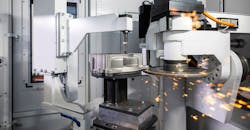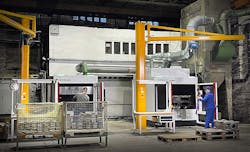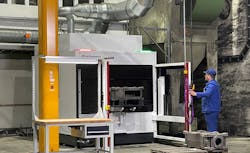Breakthrough in High-Throughput, Variable Grinding for Castings
The various problems with grinding cast parts do not, and cannot, alter the necessity of the task. Grinding, sometimes called fettling, is the initial cleaning of cooled castings after they leave the sand mold – removing excess sand, cutting away sprues, runners and other inconsistencies, and smoothing rough spots on the casting surface. It remains a manual process in some foundries, at least in part because the task involves human judgment to recognize what is required for each casting to be properly ground and prepped for subsequent processing or handling.
But manual grinding is among the worst assignments for a foundry worker, with musculoskeletal, respiratory, and audial risks to health and safety.
Automated grinding set-ups using robots have gained popularity because they improve workplace safety and reduce the reliance on manual labor. Programmable CNC grinding machine cells have become available too – though in both arrangements there is some expectation that the volume of castings must justify the investment.
In 2021, Reichmann & Sohn GmbH incorporated the brand and intellectual property of MAUS s.r.l., expanding its own position as a provider of automatic casting finishing systems – in particular, vertical turning lathes anchoring grinding cells for large castings. “Our goal is to offer our customers the best solutions for foundry automation on the market,” stated managing director Stefan Reichmann at that time.
Last year a German foundry in operation for centuries became the first location to adopt the Maus 600 casting finishing center, which Reichmann introduced late in 2021 as offering “the best of both worlds”: reliable and robust mechanical engineering with flexibility and efficiency in a compact, standardized housing.
“The aim of the development of the new Maus 600 product line was to offer foundries an easy entry from manual to automatic casting cleaning and to optimize processes for greater profitability. The new Maus 600 is a modern standard five-axis NC machine especially for small- to medium-lot sizes or linked solutions that sets new standards in automatic grinding,” according to Rafael Dineiger, international sales manager for the Reichmann Casting Finishing division.
The 600 processes large-dimension steel, brass, copper, or aluminum castings within a small footprint, and is easy to program thanks to pre-installed functions is, programming is extremely easy.Complex machining programs can be created and set-up directly on the plant floor quickly, and without any prior knowledge, according to the developer. Windows 10-based control can be operated intuitively, with diagnostic, support, and networking. Data can be collected and evaluated thanks to an IIoT-capable user interface, so it’s possible to anticipate machine downtime and plan forward, increasing productivity.
For multi-part grinding, pallet changers automatically select the right machining program for different cast parts. Despite the pallet changer, only one fixture per casting is required, saving time and money. Adaptive spindle powers ensure energy efficiency and reduce cycle times during machining.
The Schmiedeberger Giesserei in Dippoldiswalde, Germany, for more than 600 years, and lists approximately 3,500 different casting options, from 50 g to 400 kg. Its ferrous castings are supplied to OEMs that produce machinery for mobile hydraulics, mechanical engineering, and the energy sector.
Schmiedeberger had been looking for a way to automate its casting finishing operation for some time, in order to address the process costs, inconsistent results, and labor requirements that characterize manual grinding and finishing of castings.
The foundry’s management required a machine that could be operated easily and quickly by the current staff, without time-consuming training.
The Maus 600 casting finishing center convinced the Schmiedeberger team with its simple programming, high flexibility for different castings, quick installation, short cycle times, and consistent, high-quality grinding results.
"The Reichmann team advised us very well right from the start and all questions and concerns were answered directly. For us, the machine from Reichmann was the best choice because the overall package of performance and price is simply right," stated Dr. Falko Uyma, technical manager at Schmiedeberger Giesserei.
The installation took only three days, including the time to program the machine and optimize it for production. The operators were trained during that time too, despite almost no previous knowledge of CNC programming.Within three weeks of installation last fall, the foundry reported: "The machine has met our requirements and solved our problems… Currently, we have programmed two different castings with the Maus 600 and are achieving time savings of more than 50 percent”
Subsequently, Schmiedeberger ordered and took delivery of a larger and more powerful Maus 900 casting finishing machine, for automatic grinding of larger and heavier castings. With both machines, the foundry is able to automatically grind approximately 80 percent of its product range, which significantly increases productivity and cost-effectiveness.
"The high flexibility of our Maus line is particularly attractive in this target group due to the high change intervals of the castings. With the IIoT-capable control system the foundry is also optimally positioned for the future," according to Dineiger.


